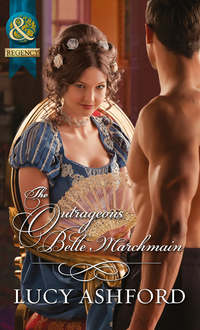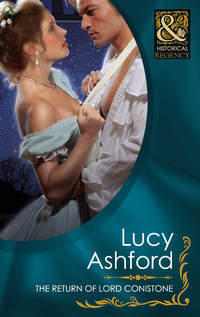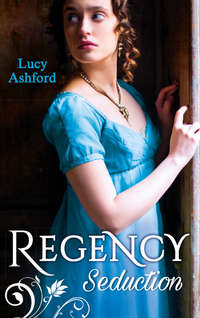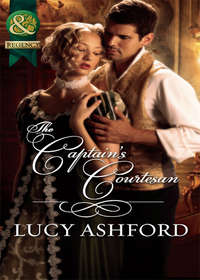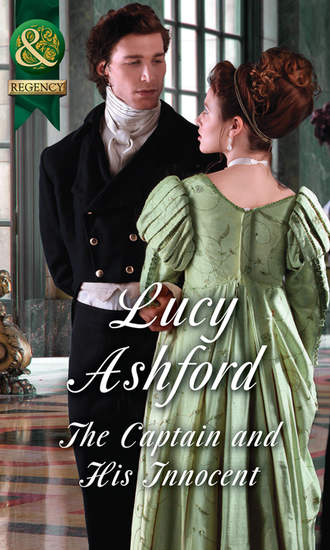
Полная версия
The Captain And His Innocent
‘Oh, look at that mist.’ Miss Pringle was shuddering. Ellie realised her companion was looking out of the window also. ‘And soon it will be dark. January. How I hate January. It’s this sort of weather, they say, that brings out the smugglers. Lord Franklin does his very best to stop their obnoxious trade, but they are desperate renegades. It’s even said they’re in league with the French—and after all, on this part of the coast, France is less than twenty miles away.’
The fishing village was no longer in sight. The road was heading inland again to carve its way through thick oak woodland, and Miss Pringle talked on. But suddenly she cried out in alarm.
‘What is this? Gracious me. Why have we stopped?’
Ellie noted the fearful expression on her companion’s features. Highwaymen, that expression said. Robbers. Murderers. ‘Please,’ said Ellie. ‘Calm yourself.’
By then one of the grooms, distinctive in Lord Franklin’s navy-and-gold livery, had appeared at the window of the carriage. ‘Begging your pardon, ladies, but it appears that half the road ahead of us has fallen away, no doubt because of the recent rain.’
Miss Pringle put her hands to her cheeks. ‘Oh, my goodness. Oh, my goodness...’
‘No reason at all to be alarmed, ma’am,’ said the groom hastily. ‘But we need to do a bit of repair work to make sure the way’s safe for Lord Franklin’s horses. It’ll take us ten, perhaps fifteen minutes—no more.’
The moment he’d disappeared, Ellie leaned forward. ‘Miss Pringle?’
‘Yes?’ Miss Pringle had got out her smelling salts and was sniffing vigorously.
‘I think I will take advantage of our halt to get a little fresh air.’
‘But you took a walk less than an hour ago, Elise, when we last stopped to change the horses! And very soon, we’ll be at Bircham Hall. Can you not wait? Besides, I’m not sure it’s safe for you to wander hereabouts, I’m really not sure at all.’
But Ellie had already opened the carriage door and was jumping down to the road, with her cloak wrapped tightly around her.
* * *
Although it was not yet four, a fierce chill was starting to pierce the air. And the mist! The mist she’d seen out at sea was rolling in across the land now, blanketing the woods that surrounded them with its clammy and sinister air. Though if she looked hard, she could still just see the road ahead. Could see, too, where the left-hand side of the road’s stony surface had fallen away, into the verge that bordered it.
That, Ellie, is the problem with insufficient drainage, she could almost hear her father saying. And look at the lack of proper foundations! You cannot build a road for heavy traffic merely by throwing a haphazard layer of rocks on top of mud. And of course the Romans knew it was often necessary to dig deep ditches on either side to take away the winter floods...
At least Lord Franklin’s two grooms were well equipped for emergencies like this. Her father would have approved of that. The grooms couldn’t see her, standing as she was in the shadows beyond the coach; but she could see that one of them had an axe to hew down the nearby saplings, and as fast as he felled them, the other was spreading them across the damaged part of the road to create a surface that would—at least temporarily—bear the weight of Lord Franklin’s coach and horses.
And as she watched them working, she realised what they were saying.
Pretty little piece, isn’t she, the girl? And she speaks good English, for a Frenchie.
Well, her mother was English, I’ve heard. An English trollop, who ran off with a Frenchman.
I wouldn’t mind running off with that one...
Ellie’s cheeks burned. So often. She’d heard the same vitriolic gossip so often. Head high, she walked away from them, back down the road they’d come along—and only when she was completely out of sight of both the carriage and the grooms did she stop, realising that her eyes were burning with unshed tears.
It is the cold air, that is all, she told herself fiercely, dashing them away with her hand. The cold.
She walked on, remembering seeing the sea and that fishing village. In what direction, she wondered suddenly, did the coast of France lie? South? East? Almost instinctively, she reached deep into the capacious pocket sewn to the inside of her cloak to pull out a small leather box.
And jumped violently as a tall figure loomed out of the shadowy woods ahead of her. The box fell to the ground, somewhere in the undergrowth beside the road.
‘If I were you,’ the man was saying calmly, ‘I wouldn’t run. There’s really not much point, I’m afraid.’
What he meant was that there wasn’t much chance of escape. From him. Ellie fought her stomach-clenching fear. This man was tall. This man was powerful. Hampered as she was by her heavy travelling clothes, she’d never make it back to the carriage before he caught her. What was he? A highwayman? One of the local smugglers, perhaps, that Miss Pringle had fretted about?
He certainly didn’t look like a law-abiding citizen. His long coat appeared to have been mended over and over again; his leather boots were spattered with mud, as if he’d walked a long way. Stubble roughened his strong jaw, and his dark wavy hair was unkempt, but his eyes were bright blue and knowing.
A man to be afraid of. Her heart was already pounding wildly; but she forced herself to speak with equal calmness. ‘You may as well know,’ she said, tilting her chin, ‘that I have nothing about me of any value. If you’re intending to rob me, you’re wasting your time.’
His eyes glinted. ‘I’m not here to rob you. I’m merely curious. I’d heard that Lord Franklin has a new ward—and you must be her.’
What was it about his voice—his deep, husky voice—that sent fresh pulses of alarm tingling through her veins? And how had he heard that she was coming to Bircham Hall?
‘I am not Lord Franklin’s ward,’ she answered. Keep your breathing steady, Ellie. Look at him with the disdain he deserves. ‘But there is a family connection. My mother was his relative...’
He came closer. Panicking, she took a step back. ‘Indeed, mam’selle,’ he said softly. ‘to find yourself suddenly in the care of a rich and aristocratic Englishman must have seemed like a fairy tale come true. Lord Franklin is said to be a great collector of foreign objets d’art. And what could be more fitting than for him to return from the Continent with a pretty French girl in his care?’
She felt her breathing coming tight and fast. She had been a fool, indeed, to have wandered so far from the coach. Play for time, she told herself. Play for time.
‘You are mistaken,’ she said steadily, ‘if you think that I would allow myself to be...collected. Lord Franklin took me in his care out of duty, that is all. In other words—no fairy tale. And unless you wish me to assume that your own intentions are unworthy, monsieur, I would ask you to let me pass—this minute!’
She’d already started to move. But he was quicker, stepping sideways to block her path, intimidating her with his height and the breadth of his shoulders.
‘Did you realise,’ he said, ‘that Lord Franklin was a relative of yours before you met him, I wonder?’
She was momentarily overwhelmed by the hard, purposeful set of his face. By the brightness and intensity of those blue eyes. No. No, she didn’t.
Memories whirled around her. Memories of a badly furnished attic room above a bread shop in Brussels. Memories of her father lying on a narrow mattress while she bathed his forehead, desperate to cool his fever. The bread-shop owner, the Widow Gavroche, hurrying upstairs to her. ‘Mam’selle, mam’selle—there is an English gentleman here to see you! His name is Lord Franklin Grayfield and he is very fine!’
Ellie had been alone, with no friends and no money. In danger there. She had thought that she’d left danger behind her now that she was in England—but this tall man who’d come prowling out of the mist reminded her otherwise.
She had to get away. But that little box...
Letting her eyes sweep downwards, she spotted it suddenly in the undergrowth. She made a swift move towards it, but he was quicker, and before she could stop him, he had stooped to pick up her small leather box for himself.
Ellie felt the blood leave her face. ‘That is mine. Give it back to me!’
He gave her a curious half-smile—and ignored her. Her heart was hammering so hard against her ribs that it hurt. He’d picked up the box with his left hand, she noticed—held it there in his palm, while with his right hand he was turning it slowly.
He wore a black glove on his right hand. And there was, she realised, something odd about it. Something wrong with it. The first two of his fingers were missing. But he had no trouble opening the box. And Ellie felt slightly sick, as the brass casing of her father’s compass gleamed in the half-light.
‘A pretty trinket,’ he was saying approvingly as he gazed down at it. ‘It must be worth something.’
‘Perhaps it is. Perhaps it isn’t.’ Ellie was sliding her hand into the folds of her cloak. ‘But, monsieur, if you’ve any sense at all, you will return it to me—immédiatement—or I swear you will regret it.’
His eyes gleamed. ‘You’re going to make me?’
For answer she lifted the small pistol she had in her hand and released the safety catch. She was pointing it straight at his heart.
His body tensed very slightly, but his eyes still glinted with mockery. ‘Mam’selle,’ he reproved. ‘Really. To go to such extremes... I take it you know how to use that thing?’
His voice. The rich, velvety timbre of it. Every word he spoke made something shiver down her spine in warning. Made her grip the pistol even tighter. ‘Do you want to find out?’ She forced her voice into absolute calmness. ‘Give me the compass back. Or I shoot.’
He watched her, his eyes assessing her. Then suddenly he laughed and held the compass out with a small nod. Ellie grabbed at it, her pulse pounding.
‘An unusual object,’ he said calmly. ‘A valuable object, I would venture to say.’ He swept her a mockery of a bow. ‘Our meeting has been interesting—but I’ll make no further effort to detain you. And I hope your stay at Bircham Hall is a pleasant one. Your servant, mademoiselle.’
And he was gone. Into the mist and woodland. As suddenly, and as silently, as he’d appeared.
She found she was gasping for breath, as if the air had been kicked out of her lungs. She remembered the gleam in his blue eyes as he gazed at the compass. Dieu. Had he had time to look at it? To really look at it?
With an enormous effort at self-control, she secured the safety catch on her pistol, then slipped it and the compass back into the pocket inside her cloak.
She hurried towards the carriage, willing her heart to stop thudding. Please God, the compass had only attracted his attention because he thought it was something he could sell. But surely he was no ordinary roadside thief. Who was he? And how did he already know so much about her?
She drew a deep, despairing breath. The answer to that was easy. Bircham Hall, Miss Pringle had frequently pointed out, was the largest and most prestigious house in this part of Kent. The staff would all have been warned of Ellie’s arrival and they would doubtless have spread the news around the neighbourhood.
That was how he knew. And he’d been watching for the coach, guessing it would have to stop there; hoping for a chance perhaps to rob its occupants. She’d provided him with the perfect opportunity, by wandering away down the road.
A common thief. That was the obvious answer. And yet she had a feeling that his intentions were somehow far, far more dangerous than that.
She could see Miss Pringle now, standing outside the carriage, visibly fretting. She let out an exclamation when she saw Ellie. ‘There you are. I’ve been imagining all sorts of terrible things...’
‘I’m all right, Miss Pringle,’ Ellie soothed her. ‘Really I am.’
Just at that moment a groom came up to inform them that the carriage was ready to set off again. And for the remainder of their journey to Bircham Hall, Ellie closed her eyes and pretended to be asleep.
But she couldn’t erase the image of the man with the maimed right hand and the dangerous blue eyes. Something strange and unfamiliar tingled through her body. Fear? No—she’d known fear often enough, and fear didn’t make your pulse race at the memory of a man’s face, of his dangerous smile. Fear didn’t make you notice a man’s thick dark lashes. Didn’t make you remember the magical curve of his lips when he smiled and make you wonder how many women he had kissed.
She would be safe at Bircham Hall, she told herself. She would have no friends, but she would be safe. And the man was surely nothing but a lowly ruffian.
Then she shivered. Because she was remembering that the stranger in the long, patched coat had spoken not like a ruffian, but like an English gentleman—and his voice had melted her insides, even though every word he spoke was either a veiled insult or a threat.
Sharp waves of panic were clawing at her throat. She’d thought she would be out of danger, when she reached England’s shores—but clearly, she could not have been more wrong.
Chapter Three
The dusk always fell swiftly along this part of the coast, blurring the lonely expanse of gorse-topped cliff and the miles of shingle beach. There were still ghostly reminders of the now-ended war with France, for in the distance was a rugged Martello tower, built in case of a Napoleonic invasion, and sometimes soldiers rode out from Folkestone to patrol the coast; though they were more likely nowadays to be hunting for smugglers rather than invaders.
Just enough light lingered for Luke to see that both headland and beach were deserted, though he could hear gulls crying out above the waves. Still on foot, he had left the woods and the road well behind him now, taking instead the ancient paths used by local fishermen and farmers until he came at last to a rough track that led to a solitary house looming up from behind a thicket of wind-stunted sycamores.
The house was said to have been built on the site of an ancient long-vanished fortress, constructed over a thousand years ago to protect this coastland from Germanic invaders. Now wreaths of mist shrouded it, whispering of past lives and of ancient battles. The locals said it was haunted; said that the fields which surrounded it, blasted by winter winds, were good only for the most meagre of crops and the hardiest of sheep. But Luke loved this landscape with a passion that was ingrained in his very being.
He loved the winters, when frost and snow shrouded the bare countryside, and howling winds blew in from the sea; winds so cold they might have come straight from the freezing plains of Russia. He loved the summers, when the fields were filled with grazing sheep and lambs, and birdsong filled the nearby marshlands from dawn till dusk.
His brother, Anthony—two years younger than he—had loved it all, too.
Anyone seeing the house from a distance would think it derelict, but the locals would tell a passing stranger that it was the residence of Luke Danbury, a spendthrift and a wastrel who had once been a captain in the army in Spain, but who had now mortgaged his family estates to the hilt and was anyway absent for much of the time, doing God knew what.
Making madcap, mysterious sea voyages, he’d heard people say. Up to no good. Away as often as he was here. Gambling, probably, and women, they muttered knowingly. Once he was engaged to an heiress—and didn’t she have a lucky escape! He’s let all his farmland, once so prosperous before the war, go to waste. And his missing brother’s a disgrace as well. The family name is ruined...
The track led up to the front gate of the house, which stood permanently open. Indeed, such was the tangle of undergrowth—old, half-wild shrubs and ivy growing all around—that Luke doubted it could ever be shut. The house itself looked uninhabited; no lights shone from any of the front windows, and wreaths of sea fog crept around the gables and turrets. But Luke pushed his way through the wreck of a garden and past the twisted sycamores, towards the courtyard and stables round the back—and there, glowing lantern light welcomed him.
There, the cobbles were well swept, with stacks of logs for burning, and bales of hay for the horses, all neatly piled under shelter. Several farms belonged to the estate, and the equipment for the usual winter jobs had been gathered there also for his tenants to collect: tools for fencing and ditching work, shovels and pickaxes.
He noted it all automatically; yes, this what he had to concentrate on now. Saving the estate. Saving the livelihoods of the men, and their families, who depended on him. But all the time, he was thinking, too, that the rumours were true—that Lord Franklin Grayfield had returned from abroad with a French girl. An orphan, they said, and a distant relative, whom Lord Franklin had taken into his care.
But Lord Franklin, as far as Luke knew, was not a man given to sudden, sentimental gestures of generosity. So why go to the trouble of bringing this girl—this relative—back to London? And why did Lord Franklin almost immediately decide to banish the girl to the Kent countryside?
Of course, there would be gossip aplenty for Luke to listen to and sift through for himself, in the taverns of Bircham Staithe harbour, or in the larger ale houses of Folkestone a few miles away. There always was gossip about a rich, clever and ultimately mysterious man like Lord Franklin. There was already gossip about this girl, too—Luke had heard from people who’d glimpsed her in London that her name was Elise Duchamp and that she was pretty, in a French sort of way. But they hadn’t told him that she went around carrying a pistol in her pocket and quite clearly knew how to use it. No one had mentioned that.
And as for ‘pretty’—was that the way to describe her rich dark curls, her full mouth and slanting green eyes? Was it her mere prettiness that had sent a jolting kick of desire to his blood—and had urged him, with age-old male instinct, to draw her slender body close, so he could feel the feminine warmth of the curves he just knew would lie beneath that old, shapeless cloak?
She was intriguing, in more ways than one. There was considerably more to her than met the eye. Take, for example, that compass.
Luke Danbury let out a breath he hadn’t even realised he was holding. He was passing the stables now, mentally registering that the horses were secure for the night. A couple of them gently whickered as he paused to stroke their noses, murmur their names. A moment later he was opening the stout door that let him in to the back of the house, inhaling the familiar scents of stonework and smoke from the fires as he walked through the flagged hall to the low-beamed dining room at the very heart of the old building.
The sound of cheerful voices told him before he even entered that Tom, the two Watterson brothers and Jacques had settled themselves extremely comfortably around the vast oak table, eating Mrs Bartlett’s hot beef stew and drinking some red French wine.
Eagerly they welcomed Luke and pulled out a chair for him, while Mrs Bartlett, Tom’s wife, came hurrying from the adjoining kitchen to ladle out a dish of stew for him. Jacques poured Luke a glass of the wine.
‘What detained you, my friend?’ asked Jacques curiously. ‘We were beginning to think you might have gone into town, to find yourself a pretty girl.’
Tom was blunter. ‘Did you find out if Lord Franklin was in the coach?’
‘He wasn’t.’ Luke drank half his wine and put his glass down. ‘Apparently he’s still in London.’
‘Then who were the girl and the old woman?’
‘The girl’s a relative of Lord Franklin’s. The other one’s her companion, I believe.’
Tom nodded wisely. ‘Ah. The orphan he’s said to have taken into his care—which must have been a surprise to everyone, cold-blooded fish that he is. I heard rumours that she’s pretty. Is she?’
‘She certainly does her best not to be.’ No more. No need to say any more.
‘She’s French, they say,’ announced Josh Watterson eagerly. ‘That’s interesting.’
‘Maybe.’ Luke poured himself more wine and the others concentrated again on their food—all except for Jacques, who was watching him sharply.
Monsieur Jacques, Luke’s men called him. He’d been a soldier, captured by the English and condemned to rot as a prisoner of war—until Luke freed him. ‘And I pay my dues,’ Jacques liked to explain to Luke’s companions. ‘I help my friends as they help me.’
It was to pay back his debts that Jacques now ran his small sailing ship with skill and bravado between the coasts of France and England on dark and misty nights such as this. But Jacques was frowning in puzzlement as he pushed his empty plate aside and said, ‘Why, my friend Luke, would Lord Franklin suddenly discover a young French relative? Why didn’t he know of her before? Surely, wealthy families such as his have their ancestry well documented for generations back?’
‘That’s true.’ Luke paused in eating his meal. ‘Their family lines are guarded as thoroughly as their fortunes, to prevent interlopers from getting any of their money.’
‘That’s exactly what I thought. Has the girl taken his fancy, do you think?’
Luke let out a bark of laughter at that. ‘Highly improbable. They say Lord Franklin hasn’t touched a woman since his wife died ten years ago—and he wasn’t overfond of her, by all accounts.’
Jacques smiled. ‘So a liaison of some sort is out of the question. But why did he go to the trouble of bringing her to England? And why—having claimed her as his responsibility—would he banish her to Bircham Hall?’
‘When I have the answers, I’ll be glad to share them with you.’
‘Indeed,’ the Frenchman said. ‘So you’re going to make enquiries, are you? Should I perhaps begin to wonder if this French demoiselle of Lord Franklin’s is more interesting than you say?’
Luke savoured his wine before putting the glass down. ‘Totally uninteresting,’ he said. ‘Too young and too proud, I imagine. Besides, I have more than enough to deal with at the moment.’
‘With your estate and your farms? I hope I sense optimism?’
Just then Mrs Bartlett came bustling in to clear away the used dishes, and Tom and the Wattersons stated their intention of carrying out their usual evening tasks. Luke sat back in his chair and took his time answering Jacques’s question. ‘I’m not sure if it’s optimism, or foolishness. I’ve found some new tenants for the farms—but do you know how much the price of English grain has dropped in the last year? I’ll be keeping the men busy, it’s true, but it might all be for nothing.’
‘You’re not wishing you’d married your heiress?’
‘Hardly. That ended almost three years ago. She’s marrying someone else in spring—someone her father considers far more suitable—although my tenants might wish I had her money to throw around.’
Jacques shook his head. ‘You’re giving them something better than money, Luke. You’re giving them hope, and you’ve got to remember that.’
Luke looked around bleakly. ‘I’m postponing bankruptcy, that’s all. I must by now have sold off everything of value that’s ever belonged to my family.’
‘You can still fight for your family’s honour. Not with sword or pistol, it’s true—but you know as well as I there are other ways. I’m going back to France tomorrow—and if your brother’s still alive, I will find him, I swear.’
Tom Bartlett came in, with more logs for the fire. ‘You’re talking about the captain’s brother?’ he said eagerly. ‘Who knows—he might even turn up here one day, right out of the blue. I can just see it, Captain Luke—he’ll ride up the track, bold as ever, and tell us all his adventures, just like he used to.’



